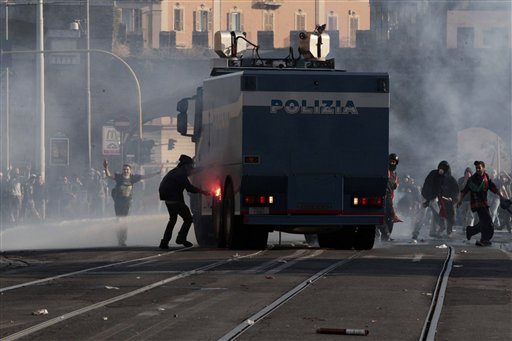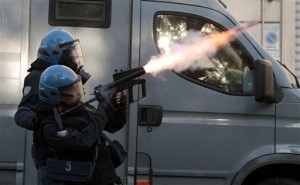The Rome March Of Indignant Youth,
Exasperated And Furious: Two Anomalies
Exasperated And Furious: Two Anomalies
By Gaither Stewart
18 October, 2011
Greanvillepost.com
Greanvillepost.com
The “Black Blocs” represent a challenge to the
system and the larger Occupy movement itself. And although the corporate
media are already painting the violence as “reprehensible” and
“unacceptable”, and many Occupy groups committed to nonviolent protest
seek to distance themselves from those who choose to express their
pent-up rage in more aggressive ways, “the hooded unknowns” clad in
black may be simply ahead of their time.

Rome demonstrators burn a police van on October
15. Their tactics present a dilemma for the nonviolent movement that may
resonate with greater force as more protesters around the world
increasingly clash with a system determined to maintain business as
usual while practicing selective repression and cosmetic reforms.
(Rome) Last October 15, up to
200,000 Italians marched in Rome in the name of change, under the vague
aegis of the “Movement”. Young and not so young from all corners of the
country marched in the direction of the huge Piazza San Giovanni where
Italians traditionally hold political manifestations. October 15 was a
landmark of the new Resistance spreading in Italy, on the one hand in
imitation of Occupy Wall Street, on the other hand a kind of summing up
of the air of not completely non-violent protest infecting the country.
Contrary to elsewhere, the state TV network, RAI 3,
covered the entire half day of the events from shortly after noon until
evening so that the entire nation could follow the demonstration from
its beginning to its bloody end, which was the second anomaly: the
transformation of a non-violent demonstration into extremely violent
guerrilla warfare so that few of the marchers ever reached Piazza San
Giovanni. Though there were some 120 casualties, government spokesmen
seemed pleased—or disappointed—to announce that there were no deaths. To
view the example of urban warfare as it happened was like viewing an
insurrection.
 Following
the script of similar manifestations throughout the world on October
15, Rome’s planned non-violent manifestation was infiltrated by from
500-1500 violent, self-proclaimed revolutionaries who were mixed among
the huge formations of singing and chanting non-violent marchers. In a
well-planned and coordinated action the organized violent infiltrators
overcame both police and the peaceful demonstrators alike and stormed
and devastated the city center, spreading fire and destruction.
Following
the script of similar manifestations throughout the world on October
15, Rome’s planned non-violent manifestation was infiltrated by from
500-1500 violent, self-proclaimed revolutionaries who were mixed among
the huge formations of singing and chanting non-violent marchers. In a
well-planned and coordinated action the organized violent infiltrators
overcame both police and the peaceful demonstrators alike and stormed
and devastated the city center, spreading fire and destruction.
Agents provocateurs? Berlusconi’s men? Black Block?
Or anarchists from the Social Centers in most Italian cities? Perhaps
the identity of the masked and hooded infiltrators wearing gas masks
comprises something of all. The insurrectionists are also called i Neri,
the Blacks, because of their dark clothes. For the government, the
October 15 violence is a revival of the air of the 1970s and 80s and the
infiltrators incarnate the spirit of the terroristic Red Brigades, last
century Europe’s most successful terrorist organization.
In any case, as of today the government is
benefiting from the violence. Police raids and house searches are
underway in cities from north to south, from Turin, Milan, Padua and
Bologna to Florence, Rome, Naples and Palermo. Numerous arrests have
been made, some persons facing up to 15 years prison, while loud voices
demanding more stringent laws are arriving in perfect timing. The
Movement fears that for the government violent and non-violent protest
are considered one and the same and that a general crackdown on all
organized protest is likely.
In an interview with a Rome newspaper, one of the
Blacks claimed that their action had been planned for a year, their
weapons—clubs and cudgels and powerful paper bombs—were hidden in the
city and that some of them were trained in urban warfare by “companions”
in Greece. He revealed that they were divided into two major phalanxes
of 500 men each, plus a group of 300 who remained with the Movement
marchers for purposes of control. The phalanxes were broken down into
small battle groups of 12-15 men. “Police,” he said, “are not prepared
to fight our rapid style of urban warfare.” The results bear out his
claims; the Blacks attacked and burned police armoured vans and
destroyed everything in their path. “This is war,” the Black from south
Italy told the two journalists. “They declared the war but it is not
over yet.”
Right or wrong, the Rome events of October 15
demonstrate for the world to see the other side of the coin of the
meaning of resistance of which everyone should be aware. The real
reality is that in Italy, deeply entrenched power is no more likely to
agree to the non-violent Movement’s demands for real change—for tight
control over financial institutions, for equality in the fiscal
structure, for the maintenance of social programs, for
employment-creating economic planning—than is Italy’s neo-fascist
criminal Prime Minister Silvio Berlusconi likely to resign and make way
for change on a government level.
The Blacks are most likely ahead of the times; yet,
in Italy, they have moved the hands of the clock ahead. They represent a
growing part of society that does not believe that non-violent sit-ins
will suffice to bring about the systemic change on everyone’s lips.
An anonymous pre-October 15 internet post
(subsequently removed) written apparently by a Black leader reads like a
call to arms and a revolutionary manifesto. Police and the National
Anti-terrorism Organization read it as a Decalogue of terrorist intents.
Whether authentic or a false flag plant, the manifesto warns: “Police
would attack us even in the absence of our conflictual intents. All of
us, revolutionaries of all tendencies, who will be present in Rome
because of our anger and because of our awareness of the abyss into
which they want to hurl us, definitively, all of us must do combat. We
cannot stop. We must give our all in order to capture and to hold the
piazza in Rome. Workers, students, marginalized people, combat!”
GAITHER STEWART serves as The Greanville Post‘s European Correspondent. His latest novel is Time of Exile, third part of the Europe Trilogy, soon to be published by Punto Press.

No comments:
Post a Comment